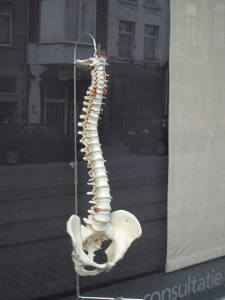It’s Called a Spine, not a Conscience
 I’ve been watching the media reaction to Marcy’s “Putting a Face . . .” post. The first day, there were a lot of “Wow – read this” tweets going around on twitter, but now the more reflective pieces are coming out, like yesterday’s Margaret Sullivan piece in the Style section of the Washington Post entitled “A journalist’s conscience leads her to reveal her source to the FBI. Here’s why.” On the whole, it’s a pretty good piece, but Sullivan makes two absolutely critical errors.
I’ve been watching the media reaction to Marcy’s “Putting a Face . . .” post. The first day, there were a lot of “Wow – read this” tweets going around on twitter, but now the more reflective pieces are coming out, like yesterday’s Margaret Sullivan piece in the Style section of the Washington Post entitled “A journalist’s conscience leads her to reveal her source to the FBI. Here’s why.” On the whole, it’s a pretty good piece, but Sullivan makes two absolutely critical errors.
First, right at the top, Sullivan doesn’t seem to understand that all sources are not created equal, though Marcy tries to correct her:
It’s pretty much an inviolable rule of journalism: Protect your sources.
Reporters have gone to jail to keep that covenant.
But Marcy Wheeler, who writes a well-regarded national security blog, not only revealed a source — she did so to the FBI, eventually becoming a witness in special counsel Robert S. Mueller III’s investigation of President Trump’s possible connections to Russia.
“On its face, I broke one of the cardinal rules of journalism, but what he was doing should cause a source to lose protection,” Wheeler told me in a lengthy phone interview.
At least Sullivan put Marcy’s “should” in italics, but for the rest of the piece she seems to have forgotten that it was there.
As I read it, Marcy’s post was not primarily about the investigation into the Russian interference in the 2016 election, though that is what has gotten a lot of the attention. What she was really talking about was the practice — or should I say “malpractice”? — of journalism. Woven into the entire post, Marcy laid out how she wrestled with a very basic question: What do you do, as a journalist, when a confidential source lies to you?
Marcy’s answer begins by distinguishing between different kinds of sources. Some tell you the truth. Some tell you something that they think is true, but it turns out to be wrong. And then there are some that tell you lies. Granting all of these sources uncritical confidentiality to protect your reputation as a journalist is as dangerous as telling a woman abused by her spouse to “protect her marriage” by staying with the abuser. “Protecting your sources” when those sources undermine your work and reputation ought not mean “protecting your abuser.” Protecting a source uncritically is just asking to get used and abused, over and over again. See “Russert, Tim.”
The second thing that Sullivan missed is that Marcy was also talking to sources — actual and potential. From the end of Sullivan’s piece, with emphasis added:
Wheeler told me she believed herself to be “uniquely informed” about something that mattered a great deal.
In their reporting, journalists talk to criminals all the time and don’t turn them in.
Reporters aren’t an arm of law enforcement.
They properly resist subpoenas and fight like hell not to share their notes or what they know because doing so would compromise their independence and their ability to do their work in the future.
Wheeler knows all that — and believes in it. But she still came forward, not because of a subpoena but because of a conscience.
As Drezner told me, “She would not do this on a whim.”
And as Wheeler put it, “I believe this is one of those cases where it’s important to hold a source accountable for his actions.”
Marcy said it right there, but Sullivan missed it. What Marcy wrestled with, and shared in her post, was how she chose to do just that. She went to the FBI as a way of holding an unreliable source accountable AND as a way to protect her honest sources from a broad, wide-ranging governmental search that could potentially come down the road.
At its core, “Putting a Face . . .” is a journalist telling the world of potential sources two things, that I might paraphrase like this:
First, I take my work seriously, and that means protecting folks who come to me with information. If you share something with me in confidence, something that helps me do my job to get important stories out, I will protect you with all I’ve got.
Second, don’t screw with me. It’s one thing to tell me something you thought was correct that later proves not to be true. That happens. But if I learn that you deliberately lied to me in an effort to harm others, and you attacked my workplace, I am going to burn your ass. Count on it.
If burning sources that lie to you is not a cardinal rule of journalism, it damn well ought to be. I suspect that Marcy’s honest sources will respect her more for this, and her dishonest ones will be very very nervous. Isn’t that something that all journalists ought to strive for?
Think about it like this: if Devin Nunes, Trey Gowdy, and the rest of the House GOP knew that the journalists to whom they spread lies, off the record, would be willing to burn them if the journalists discovered that they were being lied to and used, do you think they’d be so eager to lie?
Sullivan lauded Marcy for being a journalist with a conscience — which she is, but that’s not the point here. The point is that Marcy is a journalist with a spine.
photo h/t to bixentro, and used under Creative Commons Attribution 2.o Generic license.

 CC BY 2.0
CC BY 2.0